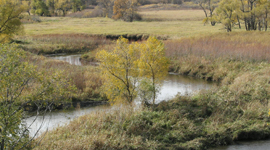Committee creates new buzz for central Iowa's water quality woes
posted
on Friday, November 20, 2015
 Earlier this fall, Capitol Crossroads, an initiative focused on creating a vision and plan for Des Moines and Central Iowa, announced its Iowa’s Water Future Advisory Committee. The new effort, convened by municipal and business interests, aims to find solutions to address nitrate pollution in Des Moines’ drinking water. The Iowa Environmental Council is participating, along with a number of other long-time stakeholders and many new players. Before long, the organizers hope to have some big ideas ready to take to the Governor and the Legislature.
Earlier this fall, Capitol Crossroads, an initiative focused on creating a vision and plan for Des Moines and Central Iowa, announced its Iowa’s Water Future Advisory Committee. The new effort, convened by municipal and business interests, aims to find solutions to address nitrate pollution in Des Moines’ drinking water. The Iowa Environmental Council is participating, along with a number of other long-time stakeholders and many new players. Before long, the organizers hope to have some big ideas ready to take to the Governor and the Legislature.
According to a recent interview in the Des Moines Register, Larry James and Steve Bruere, the two men chosen to lead the committee, report that the differences between urban and rural interests aren’t as large as they seem. “All Iowans want clean water,” they say. That sentiment is being voiced around the tables at the three meetings held thus far, and people are talking to, not at, each other. New and creative ideas are being discussed, as well as good concepts that have been around for awhile but never implemented. Throughout the conversations, some common themes seem to be gaining widespread traction:
Increasing public investment in conservation practices to reduce nitrates. The need is obvious. The Iowa Natural Resources and Outdoor Recreation Trust Fund, which the Iowa Legislature created but has so far failed to fund, would be a good start. A wider coalition of groups may now be ready to back a sales tax increase to fund the trust, of which a significant portion could be targeted for nutrient reduction efforts.
Implementing the Iowa Nutrient Reduction Strategy (NRS) in a more coordinated watershed approach. Strengthening comprehensive statewide watershed planning could include expanding the role of Iowa’s emerging Watershed Management Authorities. This would give them greater leadership for local watershed planning and serve multiple purposes from improving water quality to flood control.
Maximizing return on public and private investments to ensure that the dollars are effectively utilized. This includes assuring that assessment and monitoring are part of all watershed projects and programs to measure progress. It also means favoring practices that bring multiple benefits, such as prairie strips that offer wildlife and pollinator habitat along with soil conservation and water improvement.
Taking advantage of new technologies that can help farmers identify conservation choices that also benefit their bottom line.
The takeaway? It looks like the recommendations coming out of Iowa’s Water Future Advisory Committee have the potential to be meaningful. At the very least, the process is generating important discussion on behalf of stronger action to protect water quality -- and that’s a good thing. We’re committed to remaining actively involved and look forward to sharing new developments with you here.
If you want to learn more, or receive a copy of our short talking points for the discussion, contact me at Robinson@iaenvironment.org
- conservation
- nitrate pollution
- water quality